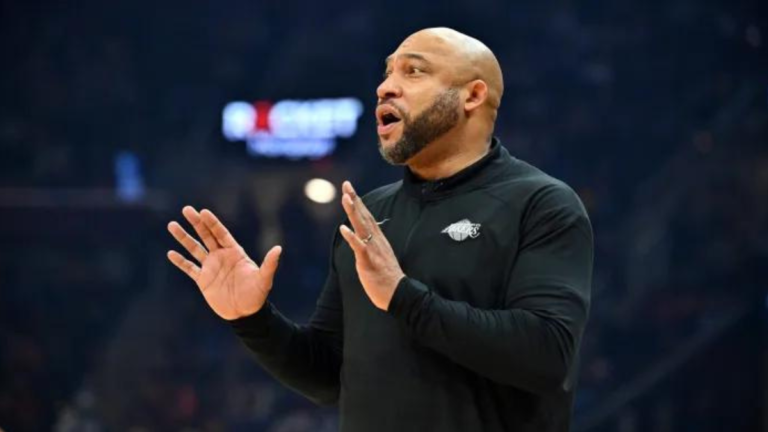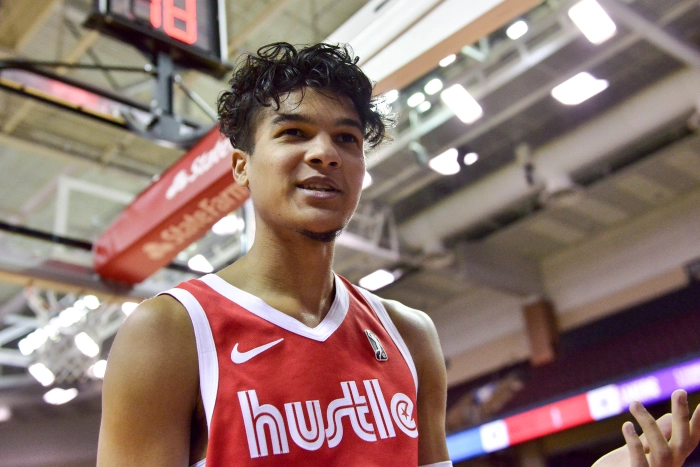
Darvin Ham, coach of the Los Angeles Lakers, and retired NBA star Michael Beasley both express their anguish. Tyrell Terry, a former Dallas Maverick, claims he retired due to nervousness.
By Ken Makin @differencemakin
As I read Los Angeles Lakers coach Darvin Ham’s harrowing story of his upbringing, three lines caught my attention: “Walk it off.”
Those three statements came after a 14-year-old Ham was struck in the face, resulting in a near-death encounter that necessitated an 11-day hospital stay. Those are the three phrases. Simple and unsweet. Short and cruel.
Those three words are suppressive language, a hereditary story that implies one feels nothing. Pain is defined as “weakness leaving the body,” not as a warning indication to your nervous system that something is amiss. A chosen few are able to overcome their lethargy and shape themselves in such a way that they produce millions. We lionize tragedies that ostensibly transform into triumphs, so it perplexes us when that hollowness calls out for help.
“As Black people, we don’t have enough therapy,” Ham said in an interview clip that went viral. “I have PTSD [post-traumatic stress disorder] to this day off them shots ringing out, getting wounded, the s— going on in my community. And… we believe it’s cowardice or weakness to seek assistance. And we’re in desperate need of assistance, buddy.”
Another NBA star provided insight from the depths in March. Michael Beasley, the second overall selection in the 2008 NBA Draft, appeared in excellent condition on an episode of The Pivot podcast. While the 6-foot-9 Beasley towered over former NFL players Ryan Clark, Fred Taylor, and Chad Crowder, he was disintegrating on the inside:
“Right now, being Black is so [expletive] phony. It’s as if motherf—ers only care when someone dies and the cameras turn on. Every day, motherf—ers demonstrate their need for assistance. Everyone out here needs assistance, and everyone is acting like they have it all together.”
Beasley’s commentary described how society not only trivialized but also commodified Black life and mortality. Even among other retired professional sportsmen, he seemed isolated and alone. The reaction to his words was predictable: if Beasley, who earned millions during his NBA tenure, truly required assistance, why didn’t he receive it?

Even as athletes continue to demonstrate that fame and the promise of financial stability aren’t enough, we lack empathy. Tyrell Terry, the 31st selection in the 2020 NBA draft, announced his withdrawal from the game on December 15 due to anxiety.
“Today I chose to let go of the game that has formed a significant part of my personality. Something that has guided my course since the first strides I made. While I’ve accomplished incredible things, made unforgettable experiences, and made lasting relationships… I’ve also been through the worst moments of my existence. It got to the stage where, instead of building me up, it started destroying me. Where I started to despise and doubt my own worth far more than those around me could ever see or know.”
For many of us, celebrity personal disasters that become public exposure are a breaking point. We see them as the conclusion, the domain of thought pieces, thoughts and prayers, and checking in on “strong friends.” When we do this, we ignore the suffering of our peers, the people with whom we interact and share experiences far more than those who live in the spotlight. Instead of addressing mental health through the myopic lens of star adulation, we ignore the young brotha stocking stores or the homeless guy who works more than 40 hours a week.
Perhaps we should begin the talk of mental health with the facts of unapologetic capitalism, and then look at the effects of racism on our collective mind as it pertains to Black males. As the father of two young Black boys, I’m always conflicted when people compliment them on their cuteness, because I’m aware of the fine line between an infant and Tamir Rice, the 12-year-old Cleveland boy who was shot by a police officer. In some instances, the weight of adulthood put on young Black males has become a death sentence. It talks to the preconceptions of Black males as a whole: savage, dumb, and sex-crazed.
The brutality of racism and the commodification of capitalism, in which human life is treated as disposable, are weighing on Black males. A harrowing title followed a February report on the rising rate of Black male suicides, which outpaced that of any other ethnic group: Is there no way out? Nettie Jones, a therapist, described how Black males frequently “suffer in silence.”
“They don’t seek the help that women will sometimes seek,” Jones said. “We’ll phone our partners and let them know things aren’t going well. Unfortunately, most Black males do not. They keep things inside, self-medicate, and are workaholics. That kind of thing isn’t good for you.”
Walk it off.
Except for those involved in the area of study known as Black male studies, there are few outlets that concentrate on the Black male experience in a manner that isn’t for entertainment. “The mass suicide-homicide killings, premature deaths, and death disparities among young Black males, ages 15 to 24, in the United States are not paranoid propaganda,” according to the abstract of a compelling 2020 article titled Premature Deaths of Young Black Males in the United States. It is unquestionably a troubling public health catastrophe that necessitates an immediate national reaction in order to reverse and eventually eliminate the early mortality of young Black men.”
The piece, which tracked the death rate for Black males from 1950 to 2010, observed that death rates rose following social justice campaigns and in the context of race-based policy.
It leads me to believe that Black males should value community over rivalry, and civil rights over fame. That is undoubtedly challenging in a capitalist world where we fight for limited resources. We see the predatory nature of the games we consume even in the world of athletics, which includes the language of unity. “Only the strong survive,” we proclaim, which does not lend itself to the healing work that our society requires. Instead, those words serve as a cover for the contentious practices that take place in commercial and collegiate sports.
Martin Luther King, a civil rights fighter, stated in 1958 that “the profit motive, when it is the sole basis of an economic system, encourages a cutthroat competition and selfish ambition that inspires men to be more concerned with making a living than making a life.” A decade later, in Memphis, Tennessee, King centered his final campaign on four words: I Am a Man.
We definitely require a lot of assistance. Dignity is a good place to start. We must address mental health not as an individual failing, but as an obvious indictment of a system that values profit over people, particularly in the labor of Black males.
The head nod is a frequent greeting between acquaintances, especially those of the Black masculine type. It is a gesture of shared affinity and disaster that comes with being Black in America. What is known does not need to be stated; however, it should be. A modest, almost conciliatory head inclination. When it comes to our common destiny, we need to be more vocal.
Ken J. Makin is a professional journalist and presenter of the podcast Makin’ A Difference. He’s thinking about his wife and kids both before and after he comments.